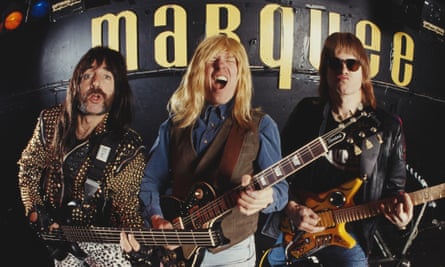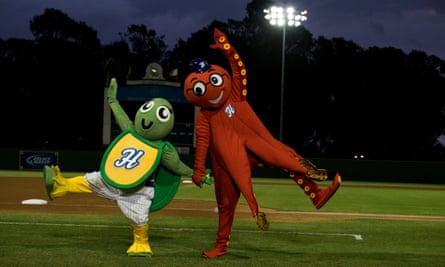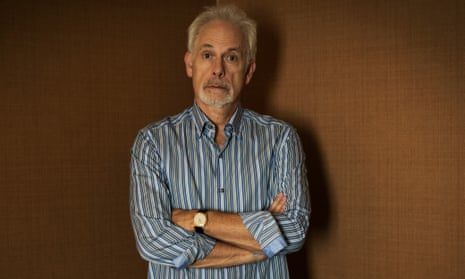Christopher Guest jets into London to unveil his new film about mascots. He says he’s fascinated by mascots and by what makes them tick. Showbusiness, he explains, involves recognition, celebrity, that whole narcissistic trip, whereas the mascot can dance on the sidelines disguised as a lion or storm the pitch as a monkey and nobody knows who the hell they are. “So they’re performing,” he says. “But they’re hidden.” The more he talks about mascots, the more wistful he becomes.
It is the fate of comedians to be forever cast as the clown, as though there’s little distinction between their work and their life. In person, Guest is an exacting, cerebral, 68-year-old film-maker. He’s lively company; he has a great, bone-dry wit. But he is emphatically not Nigel Tufnel, the gormless guitarist he played in This Is Spinal Tap, or any of the other alter-egos he has embodied down the years. Moreover, he resents people expecting him to behave like a buffoon. When he directed Best in Show, 2000’s uproarious comedy about pedigree pooches, one journalist arrived to interview him dressed up as a dog. “Maybe I’m too sensitive,” he says. “But I feel that’s not appropriate behaviour when someone – meaning me – has just spent two years working on a project. How about we take it more seriously, please?”

We meet just after Guest has introduced a screening of Mascots at the London film festival. Anyone who has seen the director’s previous work will know what to expect: a warm, funny salute to life’s underdogs, framed as a faux documentary and largely improvised by a mix of regular collaborators (Fred Willard, Parker Posey) together with a few new arrivals (Chris O’Dowd, Tom Bennett). Guest corrals his contestants to compete for the “fluffy” award at the World Mascot Championships. On stage, in front of the judges, Sid the Hedgehog performs a Keatonesque slapstick aboard a wobbling ladder. Elsewhere, Jack the Plumber’s piece-de-resistance involves unblocking a toilet and dancing with a turd.
“My son was a mascot at school,” Guest says abruptly, as if just remembering. “Small school. American football team. They didn’t even have enough students to get people on the field. My son was a hawk. The first day he said: ‘Dad, I look like a chicken’. Amazing costume. The heads had electric fans in them. The fan broke on the first day. And it was never fixed.” The memory seems to trouble him. “I don’t know why he did it. There was one picture of him standing alongside these cheerleaders. And I thought, ‘Did he just want to be surrounded by girls?’ But dressed as a hawk? Looking like a chicken? I really don’t know.”
Guest’s films are typically described as mockumentaries – a label he detests because it suggests that they are somehow mean-spirited, poking fun at their subjects. But while movies such as A Mighty Wind might initially set up its characters as deluded eccentrics, the treatment is affectionate, even weirdly respectful. By the end, against all the odds, we find ourselves rooting for them.
Besides, he adds, subcultures only appear bizarre when viewed from the outside. The closer you get, the more sense they make. “I once found a website that was obsessed with shoelaces. Now, on the surface, that might sound stupid or boring. But it’s not boring. And it’s probably not stupid. And, actually, I do one of these activities myself, which is tying fly-fishes, so who am I to judge? I sit in a chair with a magnifying glass with feathers and wool, trying to make something that looks like an insect to a fish. And I’m very happy doing it. Put some classical music on. Sit in a chair for hours at a time.”
Guest was raised as a child of privilege. His aristocratic, English-born dad was editorial director at the United Nations; his American mum an executive at CBS. So Guest grew up between the US and UK, plucking from both cultures, mimicking every accent he heard. It was a skill that served him well when he joined the ensemble teams of National Lampoon and Saturday Night Live. His breakthrough came in 1984, playing Tufnel, whose amp goes all the way up to 11. In recent years, Spinal Tap have reformed to play concerts at Carnegie Hall and Glastonbury. “So Nigel is an alter ego I can slip back into,” he explains. “There’s a comfort in playing somebody that dumb.”
He has been married for 30 years to the Hollywood actor turned author Jamie Lee Curtis. I once read that Curtis fell in love with him after seeing a photo of him as Nigel. But that, surely, is too good to be true? “Well,” he says. “There were pictures in Rolling Stone magazine in 1984. One of me as Nigel Tufnel and one of me as me. And that was the one where she said to her friend, ‘I’m going to marry that guy.’ So no, it was not Nigel. That would be disturbing. I mean, it’s crazy enough as it is.” He gives a wintry smile. “We still have that original photo hanging up at the house.”

Actually, I’m more interested in his other alter ego: Guest holds a hereditary British peerage. “I’m a baron,” he explains. “I’m Lord Haden-Guest. And yes, that’s a novelty. Born into it by accident, obviously. And then your dad dies and you’re the next one.”
For a few years he sat in the House of Lords. He loved it; it upended his preconceptions. “It wasn’t the cartoon of old men with ear trumpets. Although yes, there was an old man with an ear trumpet. But it wasn’t Downton Abbey and the Roller, none of that. Most of these people had no money. They didn’t have the country houses. They were regular people who had regular jobs. They were well informed, and lending their expertise. And the speeches were amazing, so I’m glad that I went.”
What about now? Does it have any bearing on his life? He shrugs. “Well, it has meaning for anglophiles who think it’s cool. Maybe there’s still a vestige of that. I was staying at an English hotel about five years ago and I ordered breakfast and the waiter who brought it was shaking like a leaf.” He dips into a perfect English accent. “‘Brought you your breakfast, your Lordship. I do hope it’s satisfactory. Oh God, oh God … ’, and then he spilled the breakfast all over me. And it hit me that for 800 years people were conditioned to think that way and behave that way and not make eye contact and be completely intimidated. What a horrible thought – that by an accident of birth you’re here and they’re there, bowing and scraping and spilling my breakfast on me.”
His professional life, too, has its share of bowers and scrapers. In the years since Spinal Tap, the style that he helped patent bloomed into a standalone genre. Ricky Gervais refers to Guest as “the biggest single influence on my work”, which he says is fine; Gervais is a friend. As for the rest, he’s not convinced. “I have directors come up and say: ‘I ripped you off.’ Now, personally, I wouldn’t want to walk up to someone and say that. Find your own thing, don’t copy someone else.”
Earlier that morning, Guest was a guest on the BBC Today programme. He was his usual dry, acerbic self; Nick Robinson’s questions did not seem to his liking. In the wake of the interview, his name briefly trended on Twitter. This inevitably led some people to believe he had died. I mention this to Guest and he is perplexed at the news. He has never used Twitter; he shuns all social media. The internet speaks a language he can’t begin to understand.
He asks, “Does that ever get cleared up? The announcement of my death?”
Oh yes, I assure him. It was a five-minute confusion. It’s all sorted now.
Guest nods shortly. “Well OK, fair enough. I was dead for five minutes and I never even knew.” And there it is again, that wide-eyed look of wistfulness.

Comments (…)
Sign in or create your Guardian account to join the discussion